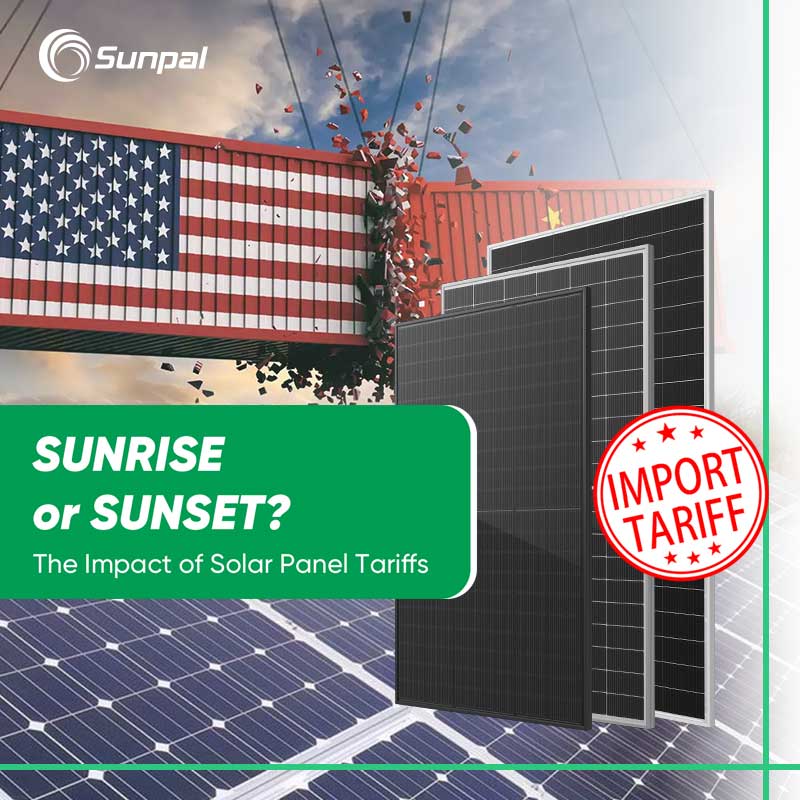
"Why are the trade winds blowing so strongly in the solar panel industry?" This question might not have been expected a few years ago, but in the present scenario, it has become a significant talking point. The US-implemented solar panel tariff policy might cause a huge impact on Chinese solar panel manufacturers and other countries. This move is expected to shift the dynamics of the industry significantly, pushing stakeholders to rethink their strategies. To understand the severity and far-reaching effects of this situation, we need to delve deeper into the issue.
Overview of the Trade War over Solar Panel Tariffs
The eruption of the US-China trade war led to a strategic shift in the solar panel industry. The US administration, in an attempt to protect its domestic manufacturers, imposed significant tariffs on imported solar panels. This move was primarily targeted at China, the world's largest producer of solar panels, but it also extended its effects to other countries. The aim was to level the playing field for American manufacturers and encourage domestic production. However, the implications of this move have been far-reaching, affecting the global solar industry.
Impact on the Solar Panel Industry
Trade tariffs on solar panels can potentially affect the cost dynamics of the solar industry. With import taxes on panels, there might be a rush to locally manufacture solar panels. However, this may not be a feasible solution for all countries, especially those without the necessary infrastructure or resources to produce solar panels at a competitive cost. Additionally, such a scenario could also lead to a surge in prices, making solar energy less affordable for consumers. The implications are not just limited to the manufacturers and consumers, but it also affects the overall development and adoption of green technology.
Effects on Global Green Tech Initiatives
The tariff war also poses substantial challenges for global green tech initiatives, like those led by startups such as Energy Vault. These initiatives largely rely on affordable solar panels to build sustainable projects. The tariffs could hinder their progress and make renewable energy projects less economically viable. This could slow down the global shift towards renewable energy and hamper our collective efforts to combat climate change.
Implications for Renewable Energy Projects
The implications of this trade war extend beyond the solar panel manufacturers. It directly impacts renewable energy projects that rely on affordable solar panels. The increase in costs may result in slower adoption of solar energy, hampering global efforts to combat climate change. This could result in a slowdown in the implementation of renewable energy projects, thereby affecting our global goals of reducing carbon emissions and mitigating the effects of climate change.
Challenges Faced by Solar Panel Manufacturers
Solar panel manufacturers, particularly those in China, face significant challenges as a result of these tariffs. The increased costs put immense pressure on them to maintain their competitiveness, either by reducing production costs or by diversifying their market outreach. This could lead to increased research and development costs, and could potentially slow down the pace of innovation in the industry.
Potential Consequences for Waste Management Measures
An unintended consequence of this tariff war could be an increase in waste. Without proper regulations and practices, the rush to locally manufacture solar panels could exacerbate the generation of waste. This presents another challenge for countries looking to transition to renewable energy sources. The
improper disposal of solar panels could result in harmful environmental impacts, thereby negating the benefits of switching to green energy.
Strategies for Navigating the Trade Winds
To navigate these trade winds, manufacturers can explore strategies such as investing in research and development to improve efficiency and reduce costs, diversifying their supply chains, and exploring alternative markets. They could also lobby for better trade policies that support the global shift towards renewable energy. This requires a combination of smart strategic planning, innovative thinking, and a commitment to sustainability.
The Role of Government Policies in Mitigating Trade War Effects
Government policies play a crucial role in mitigating the effects of trade wars. Governments can foster a conducive environment for local solar panel production, implement stringent waste management regulations, and advocate for fair global trade practices. The role of government in shaping the future of the solar industry cannot be overstated. It is their responsibility to balance the interests of domestic manufacturers while ensuring the smooth transition towards a greener future.
The solar panel tariff war is a complex issue with far-reaching implications. While it presents challenges, it also offers opportunities for innovation and strategic thinking. As the world continues to pursue a sustainable future, it is crucial to navigate these trade winds with wisdom and foresight. Navigating this complex landscape requires a comprehensive understanding of the industry, a proactive approach to innovation, and a commitment to sustainable development.
